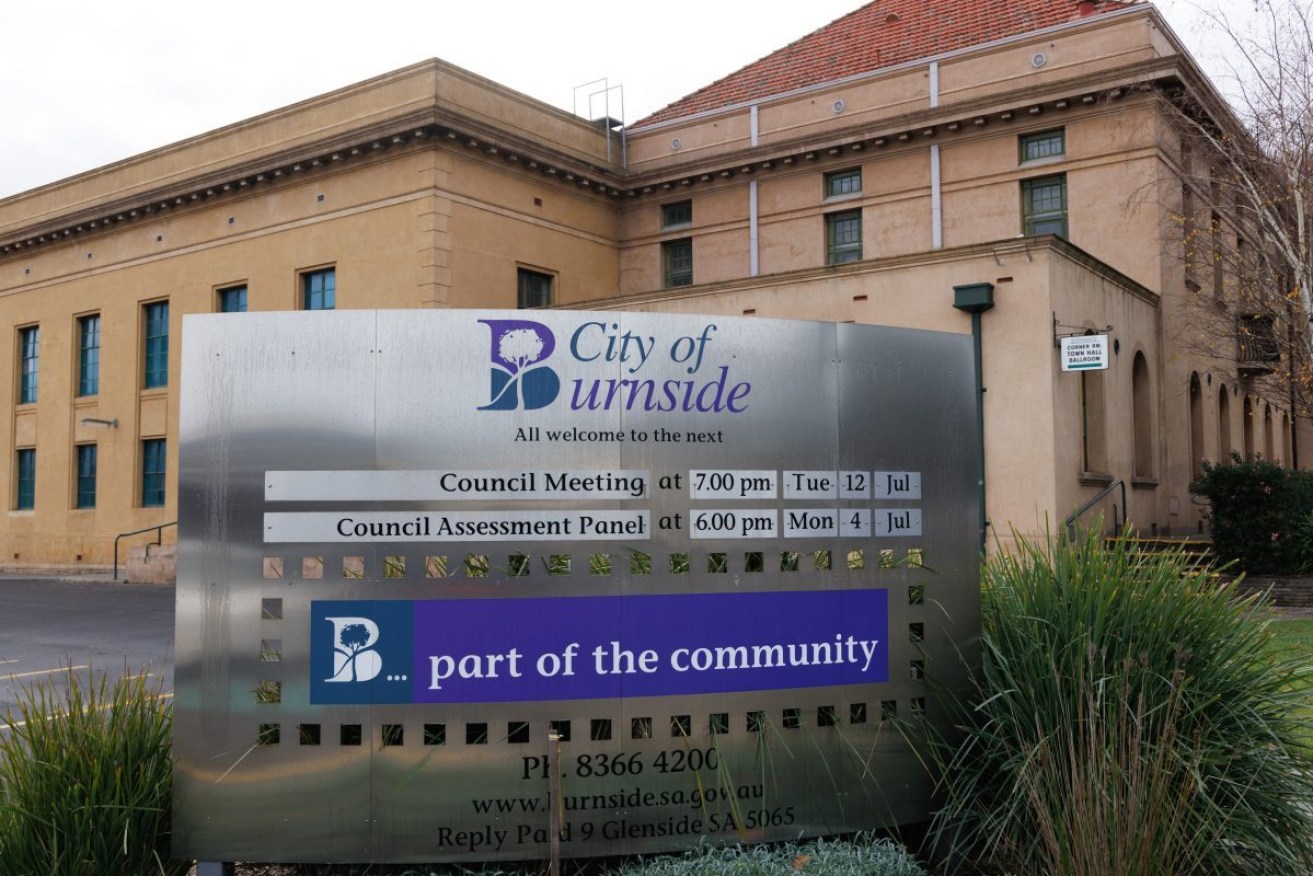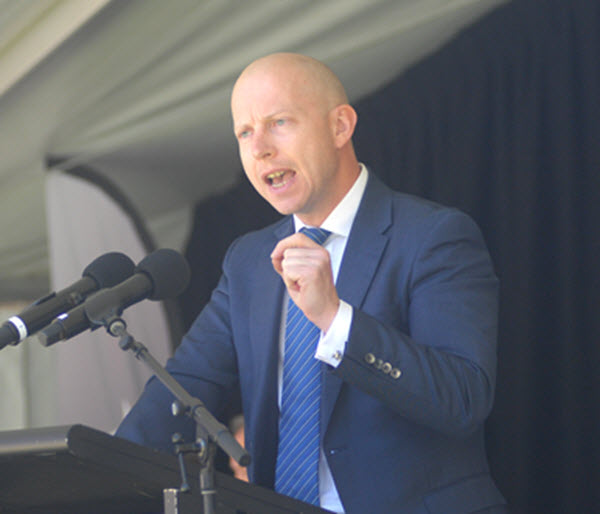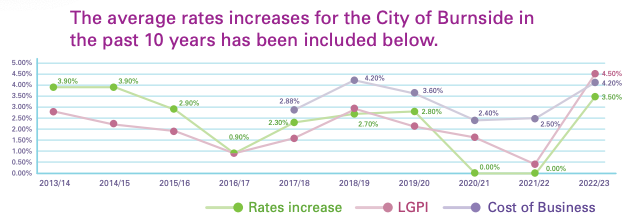‘Complete waste’: Council slams watchdog’s rate ‘advice’ scheme
An eastern suburbs council has blasted the Essential Services Commission for demanding it pay more than $45,000 for “blatantly obvious” advice about spending and rates, branding the government-mandated scheme “a waste of ratepayers’ money”.


The City of Burnside has taken aim at a new government program which aims to advise councils on long term financial planning. Photo: Tony Lewis/InDaily
The Essential Services Commission of SA (ESCOSA) is currently rolling out a “Local Government Advice Scheme” which requires the state’s 68 councils to submit a range of financial documents to the Commission in exchange for “advice” about the “appropriateness of council’s long-term financial plans”.
ESCOSA and the councils are required by legislation to publish the advice once finalised.
Each council is also required to publish any response it has to the advice, although ESCOSA cannot compel councils to follow its suggestions.
According to ESCOSA, the aim of the scheme is to “give ratepayers confidence that the rates they pay are set at the level necessary for their council to provide the services they value”.
“The advice will also provide to ratepayers and other interested stakeholders an independent consideration of a council’s plans, thereby adding value across local communities,” ESCOSA states.
The four-year scheme was introduced as part of the former Marshall Government’s local government reforms that passed parliament in 2021. It began rolling out to an initial 15 councils in April 2022.
But City of Burnside CEO Chris Cowley has asked Local Government Minister Geoff Brock to reconsider the scheme which the council branded “another costly bureaucratic process” that is “ill conceived; a waste of ratepayers’ money” and a “complete waste of our council staff and resources”.
In a letter to Brock on December 2, Cowley said all councils were “initially” informed they would need to pay $52,000 to ESCOSA for the advice scheme – which is “more than the City of Burnside pays for a full financial audit”.
“The irony is not lost on us that this ‘Advice Scheme’ which ostensibly is about curbing council spending to keep costs in check and limit rate rises, will have the opposite effect,” Cowley wrote.
“There will be more costs to Council (paid to ESCOSA) that achieves nothing but taking funds from Council’s bottom line that should be directed to our programs and services for ratepayers.”
Under the legislative changes passed in 2021, ESCOSA is allowed to recover from councils “costs reasonably incurred” carrying out the advice scheme.
Cowley claimed ESCOSA representatives “could not provide any information as to the likely cost of their advice to councils” during a meeting with senior council staff on October 31, 2022.
He also criticised the scope and potential content of ESCOSA’s advice as “basic” and “blatantly obvious”.
“When comment was given as to the types of advice we might receive or considerations ESCOSA were taking into account into their review of a Council’s finances, the following examples were provided:
- If a council doesn’t have an asset management plan on their website or only has one in draft form, that might be a finding of the Commission;
- ESCOSA will be considering longer term trends about what council’s assumptions are around inflation as that is obviously important at the moment.
“It is difficult to comprehend that at a cost to ratepayers of up to $80k, or even more for some councils, ESCOSA would really provide such basic advice to councils.”

Burnside Council CEO Chris Cowley. Photo supplied.
ESCOSA denies the cost of the scheme could reach $80,000 per council.
Cowley said the City of Burnside’s external and internal auditors already provide advice on council’s asset management plans, and “it is blatantly obvious in the current climate that assumptions around CPI need to be updated in Long Term Financial Plans at least annually”.
He also said information on the council’s long term financial planning and infrastructure management “is already publicly available” and councils “can already be compared with each other across a range of indicators using the ‘Councils in Focus’ website”.
“Further, the notion of looking back through the last ten years of a council’s plans and documents looking for trends, is incredibly futile without knowing the context of decisions of council and changes that may have happened in a council during that time period,” Cowley wrote.
“In summary, the City of Burnside strongly urge you (Minister Brock) to reconsider the requirement for councils to be provided with ‘advice’ from ESCOSA, before more ratepayers funds are wasted on something that by ESCOSA’s own admission, it can’t compel Councils to follow.”
In response to the criticism raised in the letter, ESCOSA chief executive Adam Wilson told InDaily the Commission “has no separate source of funding” to carry out its advisory scheme functions.
He also denied the cost of the scheme could reach $80,000 for individual councils, saying “the Commission is unaware of the claimed $80,000 figure or its basis”.
“During public consultation last year, prior to the scheme starting, the Commission transparently set out its best pre-estimate of those costs,” Wilson said.
“That pre-estimate was $47,466 for each of the State’s 68 local councils over the four-year period of the scheme (or $11,866 annually for each local council).”
“The Commission noted at the time that it would refine its estimates as it commenced the role from September 2022, which it is currently considering, with the potential to realise efficiencies through the process and therefore to reduce scheme costs.”
ESCOSA’s draft “framework and approach” document estimated the cost of the program over four years to be $3,545,001 ($52,133 per council).
In August 2022, the cost was revised down to $3,227,697 ($47,466 per council), although ESCOSA said at the time it could “only proceed based on its best estimates of expected effort and cost”.
“In particular, the degree of interaction with each council is unknown,” ESCOSA said.
ESCOSA’s framework document also acknowledged it received feedback during the public consultation that “considered the cost per council excessive and driven by the fact the draft [framework & approach] over-scopes the Commission’s role”.
“While the decision to recover costs from a council is, under the [Local Government] Act, discretionary on the part of the Commission, absent any other funding source it will need to exercise that discretion,” ESCOSA said in August 2022.
“At this time, the Government has not indicated that it proposes to otherwise fund the Commission’s scheme role and functions.
“Whether a council chooses to pass its allocation of the Commission’s costs on to ratepayers, either in part or all, is ultimately a decision for that council.”
InDaily sought comment from the office of Local Government Minister Geoff Brock. In response, a government spokesperson indicated there would be no changes to the scheme.
“ESCOSA closely engaged with councils while developing the detail of the scheme and will continue to do so, particularly the… councils that will receive the first round of advice from ESCOSA in February 2023,” the spokesperson said in a statement.
“Making changes while the scheme is in its early implementation would not be able to properly consider any real benefits or impacts for councils, and, most importantly, their ratepayers.”
The City of Burnside is one of 15 South Australian councils taking part in the first year of the four-year advice scheme.
The 15 councils were due to submit financial information, including long-term financial plans, revenue sources and infrastructure and asset management plans, to ESCOSA on September 30 last year.
ESCOSA is due to provide its first round of advice to councils on February 28.
The average rate for a residential property in the City of Burnside is $1917 a year, or $36.86 a week, according to the council’s most recent annual business plan.
The Council adopted a 3.5 per cent average rate increase for 2022/23 after two years of no increases.

A graph showing rate increases in the City of Burnside over the last 10 years compared to the cost of council business and the Local Government Price Index (LGPI). Image: City of Burnside
According to the state government’s ‘Councils in Focus’ tracker, the City of Burnside netted $39.38 million in council rates in 2020 – above the statewide council average of $24.33m but below the $57.95m average for similarly sized councils.




